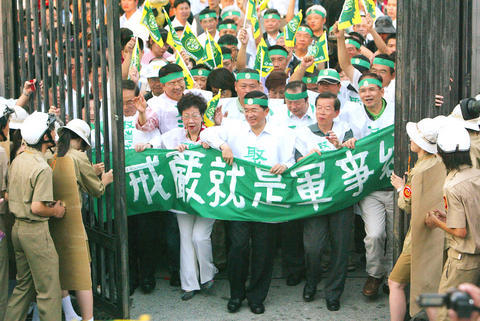The lifting of martial law was a reaction to public demand to exercise their rights rather than the benevolent gesture of a particular individual, President Chen Shui-bian (
Martial law was implemented on May 20, 1949, and was not lifted until July 15, 1987.
"Ending martial law not only meant we wanted to fight for the freedom to organize political parties and the right to vote, but also to tell the dictator that the people were the real masters of the nation and all rights that had been taken from the people should be returned in full to the people," Chen, wearing a green protest headband, said at a rally at Taipei's Lungshan Temple to mark the occasion.

PHOTO: CNA
The rally, sponsored by the Democratic Progressive Party (DPP), reached a climax when Chen, Vice President Annette Lu (
They then recreated a sit-in that Chen, Hsieh, Chang and other democracy activists had staged inside the temple on May 19, 1986, to demand the lifting of martial law. A group of DPP staffers were dressed in police uniforms, acting as riot cops from the martial law period to stop the protesters.
Hundreds of onlookers waved flags and chanted slogans.
Calling the martial law period "a dark era without right and wrong and justice," Chen said every Taiwanese had been "victimized" under the rule.
Commemorating the hardships that the public went through, martial law is a "a reminder that we should not make the same mistake again," he said.
Addressing the pan-blue camp's accusations that the DPP was seeking political gains by playing up the Chinese Nationalist Party's (KMT) past ills, Chen said such criticism was a "total denial of the efforts Taiwanese have made over the past 100 years or so."
Chen said that the mindset and ideals of people who had made such accusations were trapped in the martial law era, adding that they continued to look back and long for a time when they occupied a "prom-inent position and were alienated from the common people."
Hsieh said that although he has advocated "reconciliation and coexistence" and that it is right to forgive those who inflicted harm through martial law, "we can never allow the party that inflicted this harm to rule us again."
"We can forgive a `caretaker' who harmed our people, raped our daughters and stole our property, but we can never allow him to be the caretaker again," he said. "It is not a matter of right and wrong. It is a matter of defending the character of Taiwanese people."
Meanwhile, the Government Information Office and the Kaohsiung City Government will sponsor a concert today in Kaohsiung to mark the 20th anniversary of the end of martial law.
The concert, to be held at Jungkuang pier in Kaohsiung, will feature songs and melodies banned during the martial law era.
It is expected to attract more than 20,000 people, a Kaohsiung official said.
For safety concerns, it is suggested that participants use public transportation in order to avoid traffic jams.
Traffic controls will be imposed in the nearby region beginning at 2pm. The concert will take place from 7pm to 10pm.
Additional reporting by CNA and AP
Also see stories:
Taiwanese society under martial law remembered
Novelists share their experiences

The US government has signed defense cooperation agreements with Japan and the Philippines to boost the deterrence capabilities of countries in the first island chain, a report by the National Security Bureau (NSB) showed. The main countries on the first island chain include the two nations and Taiwan. The bureau is to present the report at a meeting of the legislature’s Foreign Affairs and National Defense Committee tomorrow. The US military has deployed Typhon missile systems to Japan’s Yamaguchi Prefecture and Zambales province in the Philippines during their joint military exercises. It has also installed NMESIS anti-ship systems in Japan’s Okinawa

‘WIN-WIN’: The Philippines, and central and eastern European countries are important potential drone cooperation partners, Minister of Foreign Affairs Lin Chia-lung said Minister of Foreign Affairs Lin Chia-lung (林佳龍) in an interview published yesterday confirmed that there are joint ventures between Taiwan and Poland in the drone industry. Lin made the remark in an exclusive interview with the Chinese-language Liberty Times (the Taipei Times’ sister paper). The government-backed Taiwan Excellence Drone International Business Opportunities Alliance and the Polish Chamber of Unmanned Systems on Wednesday last week signed a memorandum of understanding in Poland to develop a “non-China” supply chain for drones and work together on key technologies. Asked if Taiwan prioritized Poland among central and eastern European countries in drone collaboration, Lin

Renewed border fighting between Thailand and Cambodia showed no signs of abating yesterday, leaving hundreds of thousands of displaced people in both countries living in strained conditions as more flooded into temporary shelters. Reporters on the Thai side of the border heard sounds of outgoing, indirect fire yesterday. About 400,000 people have been evacuated from affected areas in Thailand and about 700 schools closed while fighting was ongoing in four border provinces, said Thai Rear Admiral Surasant Kongsiri, a spokesman for the military. Cambodia evacuated more than 127,000 villagers and closed hundreds of schools, the Thai Ministry of Defense said. Thailand’s military announced that

CABINET APPROVAL: People seeking assisted reproduction must be assessed to determine whether they would be adequate parents, the planned changes say Proposed amendments to the Assisted Reproduction Act (人工生殖法) advanced yesterday by the Executive Yuan would grant married lesbian couples and single women access to legal assisted reproductive services. The proposed revisions are “based on the fundamental principle of respecting women’s reproductive autonomy,” Cabinet spokesperson Michelle Lee (李慧芝) quoted Vice Premier Cheng Li-chiun (鄭麗君), who presided over a Cabinet meeting earlier yesterday, as saying at the briefing. The draft amendment would be submitted to the legislature for review. The Ministry of Health and Welfare, which proposed the amendments, said that experts on children’s rights, gender equality, law and medicine attended cross-disciplinary meetings, adding that